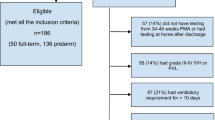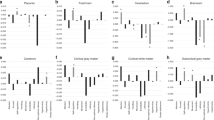Abstract
Objective
To study the effect of maternal pre-eclampsia on the short-term neurobehavioral outcomes in late preterm neonates using Neurobehavioral Assessment of Preterm Infants (NAPI) score.
Methods
30 late preterm neonates born to mothers with preeclampsia, and thirty controls born to mothers without pre-eclampsia were enrolled, and followed up to 40 weeks of post-menstrual age. They were evaluated by NAPI score of MDV (Motor development-vigor) and AO (Alertness orientation) at 40 wk.
Results
The mean NAPI score of MDV in cases was 60.1 (9.56) as compared to 70.0 (11.48) in controls (P <0.001). The mean NAPI score of AO in cases was 37.45 (11.04) as compared to 45.6 (13.33) in controls (P=0.006).
Conclusions
Late preterm neonates born to mothers with pre-eclampsia have poor short term neurobehavioral outcomes.
Similar content being viewed by others
References
Duley L. The global impact of pre-eclampsia and eclampsia. Semin Perinatol. 2009;33:130–7.
Backes CH, Markham K, Moorehead P, Cordero L, Nankervis CA, Giannone PJ. Maternal preeclampsia and neonatal outcomes. J Pregnancy. 2011;2011:214–365.
Gray PH, O’Callaghan MJ, Mohay HA, Burns YR, King JF. Maternal hypertension and neurodevelopmental outcome in very preterm infants. Arch Dis Child. 1998;79:88–93.
Szymonowicz W, Yu VY. Severe pre-eclampsia and infants of very low birth weight. Arch Dis Child. 1987;62:712–6.
WHO. Make every mother and child count. In, The World Health Report 2005, World Health Organization, Geneva, Switzerland, 2005.
Raju TN, Higgins RD, Stark AR, Leveno KJ. Optimizing care and outcome for late-preterm (near-term) infants: a summary of the workshop sponsored by the National Institute of Child Health and Human Development. Pediatrics. 2006; 118:1207–14.
Korner AF, Constantinou J, Dimiceli S, Brown BW Jr, Thom VA. Establishing the reliability and developmental validity of a neurobehavioral assessment for preterm infants: a methodological process. Child Dev. 1991;62:1200–8.
Rao R, Sampers JS, Kronsberg SS, Brown JV, Desai NS, Anand KJ. Neurobehavior of preterm infants at 36 weeks postconception as a function of morphine analgesia. Am J Perinatol. 2007;24:511–7.
Johnston CC, Filion F, Snider L, Majnemer A, Limperopoulos C, Walker CD, et al. Routine sucrose analgesia during the first week of life in neonates younger than 31 weeks postconceptional age. Pediatrics. 2002;110:523–8.
Constantinou JC, Adamson-Macedo EN, Mirmiran M, Ariagno RL, Fleisher BE. Neurobehavioral assessment predicts differential outcome between VLBW and ELBW preterm infants. J Perinatol. 2005;25:788–93.
Salzbank J, Finik J, Nomura Y. Impact of preeclampsia on birth outcomes and long-term neurobehavioral dysfunction. Conference Abstract. Comprehensive Psychiatry. 2014;55:e57.
Cheng SW, Chou HC, Tsou KI, Fang LJ, Tsao PN. Delivery before 32 weeks of gestation for maternal pre-eclampsia: neonatal outcome and 2-year developmental outcome. Early Hum Dev. 2004;76:39–46.
Whitehouse AJ, Robinson M, Newnham JP, Pennell CE. Do hypertensive diseases of pregnancy disrupt neurocognitive development in offspring? Paediatr Perinat Epidemiol. 2012;26:101–8.
Stephens BE, Liu J, Lester B, Lagasse L, Shankaran S, Bada H, et al. Neurobehavioral assessment predicts motor outcome in preterm infants. J Pediatr. 2010;156:366–71.
Constantinou JC, Korner AK. Neurobehavioral Assessment of the Preterm Infant as an instrument to enhance parental awareness. Children’s Health Care. 1993;22:39–46.
Koldewijn K, van Wassenaer A, Wolf MJ. A neurobehavioral intervention and assessment program in very low birth weight infants: outcome at 24 months. J Pediatr. 2010;156:359–65.
Silveira RC, Procianoy RS, Koch MS, Benjamin AC, Schlindwein CF. Growth and neurodevelopment outcome of very low birth weight infants delivered by preeclamptic mothers. Acta Paediatr. 2007;96:1738–42.
Steegers EA, von Dadelszen P, Duvekot JJ, Pijnenborg R. Preeclampsia. Lancet. 2010;376:631–44.
Noble Y, Boyd R. Neonatal assessments for the preterm infant up to 4 months corrected age: A systematic review. Dev Med Child Neurol. 2012;54:129–39.
Diagnosis and management of pre-eclampsia and eclampsia. Clinical management guidelines for obstetrician gynaecologist. Obstet Gynaecol. 2002; 99:159–67.
D Silva IB, D Cunha PAG, Linhares MBM, Martinez FE, Camelo JS, Jr. Neurobehavior of preterm, small and appropriate for gestational age newborn infants. Rev Paul Pediatr. 2018;36:407–14.
Funding
Funding: None; Competing interests: None stated.
Author information
Authors and Affiliations
Corresponding author
Rights and permissions
About this article
Cite this article
Bandiya, P., Datta, V. & Saili, A. Short Term Neurobehavioral Outcomes in Late Preterm Neonates Born to Pre-Eclamptic Mothers. Indian Pediatr 56, 485–488 (2019). https://doi.org/10.1007/s13312-019-1574-7
Received:
Revised:
Accepted:
Published:
Issue Date:
DOI: https://doi.org/10.1007/s13312-019-1574-7




